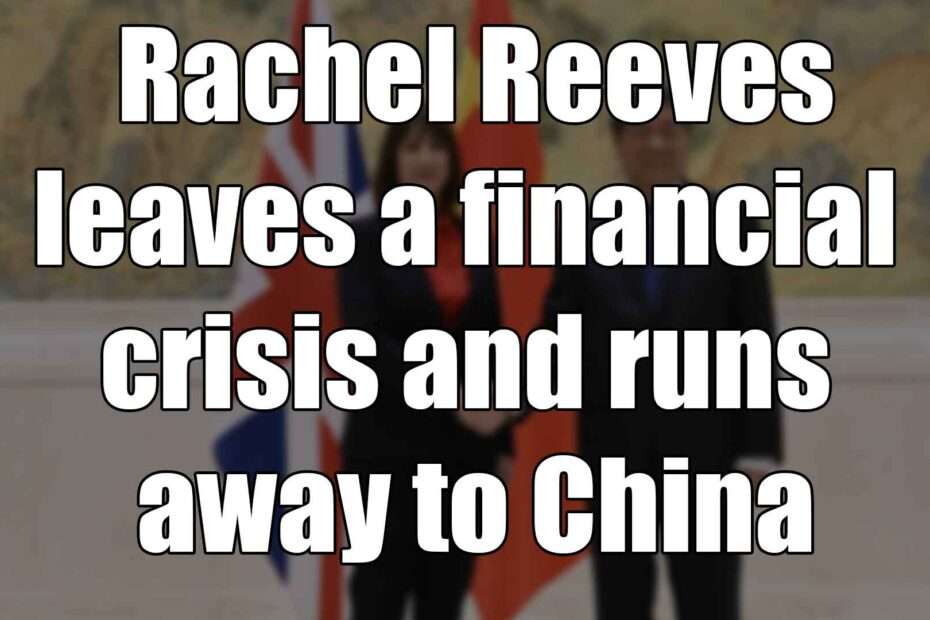Rachel Reeves leaves a financial crisis and runs away to China
Mortgage Crisis Deepens as Chancellor Reeves Faces Economic Turmoil During China Visit
The UK economy faces mounting pressure as mortgage rates are expected to surge above 5% for both two-year and five-year fixed deals, even for borrowers with substantial 25% equity or deposits. This development comes as a significant blow to homeowners who had been eagerly anticipating interest rate reductions throughout the year. Initial forecasts of four potential rate cuts have now been drastically reduced to just one possible decrease for the entire year.
Financial experts are pointing to decisions made in the Autumn budget, particularly the increased tax burden on businesses, as key factors contributing to stunted economic growth and escalating borrowing costs. Adding to the complexity of the situation, Chancellor Rachel Reeves is currently in China, accompanied by Andrew Bailey, the Governor of the Bank of England, and Nikhil Rathi, the Chief Executive of the Financial Conduct Authority (FCA). This timing has raised eyebrows across the financial sector, as three of Britain’s most senior financial figures are abroad whilst the pound faces significant pressure.
The scale of Britain’s fiscal challenges is becoming increasingly apparent, with government spending reportedly £100 billion more than Conservative projections. Lord Spencer has described the situation as “catastrophic” and publicly criticised Reeves’s decision to proceed with the China trip. The criticism has been echoed across the economic spectrum, from financial analysts to representatives of the Confederation of British Industry (CBI).
Despite mounting pressure, the Chancellor has reinforced her position, standing firmly by her budget decisions through recent media appearances. However, critics argue that this stance, combined with her absence during a crucial economic period, projects an image of avoidance rather than leadership. Many suggest that a more appropriate response would have been to address the British public directly through television appearances or newspaper columns to explain her economic strategy before departing for China.
The situation in the bond markets is particularly concerning, with yields reaching their highest levels since 1998. Contrary to typical economic patterns, these elevated borrowing costs have not strengthened the currency. Instead, the pound continues to weaken, suggesting that investors are losing confidence in sterling and increasingly moving their capital into safe-haven assets such as gold.
The implications for government finances are severe, with debt interest payments now exceeding £100 billion annually. This means that approximately one pound in every four of government spending is being directed towards servicing debt rather than funding public services. The government’s position that they haven’t increased taxes on working people has been met with scepticism, as various indirect tax measures impact different sectors of society.
The opposition’s response in Parliament, delivered by Darren Jones, has been criticised for displaying a dismissive attitude towards these concerns, particularly his assertion that “markets continue to function in an orderly way.” This response has been interpreted by many as indicative of a broader governmental arrogance in the face of mounting economic challenges.
Former Prime Minister Boris Johnson has entered the debate with characteristic flair, suggesting it’s time for “Rachel from accounts” to receive her P45, adding a political dimension to the economic crisis. This intervention raises questions about potential leadership changes within the Shadow Treasury team, though critics note that finding a suitable replacement for Reeves would be challenging, particularly given the need to potentially reverse some of the recent budget announcements.
The current economic situation has also shifted the political narrative, making it increasingly difficult for Labour to attribute all economic challenges to the previous 14 years of Conservative governance. The immediate impact of recent policy decisions has created a distinct set of economic pressures that require urgent attention and potentially significant policy revisions.

